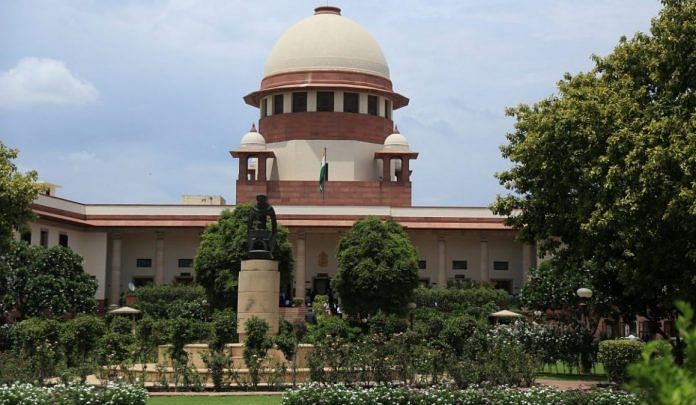Here are excerpts from Tuesday’s Supreme Court judgment, which reinstated Alok Verma as CBI director, but with riders.
New Delhi: The Supreme Court Tuesday reinstated CBI director Alok Verma though it restrained him from taking major policy decisions till a high-powered committee took a call on his future in the investigative agency.
An apex court bench led by Chief Justice of India Ranjan Gogoi reiterated that the CBI director was protected by the provisions of the Delhi Special Police Establishment (DSPE) Act, which governs the functioning of the CBI. The Act bars the director’s transfer before the completion of their statutory two-year term, unless in consultation with a committee under the central vigilance commissioner.
Verma’s two-year term ends 31 January.
“That the rule of law is the bedrock of democracy would hardly require any reiteration,” the opening paragraph of the 44-page judgment reads. “However firmly entrenched the principle may be, it gets tested in a myriad of situations that confront the courts from time to time. The present is one such occasion,” it adds.
Here are some excerpts from the judgment.
On the CBI director’s independence
“An in-depth consideration of the matter leaves us with no doubt that the clear legislative intent in bringing the aforesaid provisions to the statute book are for the purpose of ensuring complete insulation of the office of the director, CBI, from all kinds of extraneous influences, as may be, as well as for upholding the integrity and independence of the institution of the CBI as a whole.”
“The long history of evolution has shown that the institution of the CBI has been perceived to be necessarily kept away from all kinds of extraneous influences so that it can perform its role as the premier investigating and prosecuting agency without any fear and favour and in the best public interest.”
“The head of the institution, namely the director, naturally, therefore, has to be the role model of independence and integrity which can only be ensured by freedom from all kinds of control and interference except to the extent that Parliament may have intended.”
“Such intendment, in our considered view, would require all authorities to keep away from intermingling or interfering in the functioning of the Director. In a situation where such interference may at all be called for, public interest must be writ large against the backdrop of the necessity.”
Also read: Alok Verma back as CBI chief but powerless: Setback for Modi govt or SC order lacks teeth?
On Alok Verma’s reinstatement
“As the issue of divestment of power and authority of the director, CBI, is still open for consideration by the committee [comprising the PM, CJI and leader of the opposition in the Lok Sabha, as directed by the Supreme Court Tuesday] and our interference with the impugned orders has been on the ground indicated above, we deem it proper to direct that the petitioner, Shri Alok Kumar Verma, Director, CBI, upon reinstatement, will cease and desist from taking any major policy decisions till the decision of the committee permitting such actions and decisions becomes available within the time-frame indicated.”
On Vineet Narain judgment
Moved on a petition filed by journalist Vineet Narain over certain hawala cases, a judgment issued by the Supreme Court in 1997 laid down guidelines to ensure the CBI’s autonomy. This is called the Vineet Narain judgment.
“The legislature in its wisdom had not considered the necessity of tempering down the directions of this court in [the] Vineet Narain [case] in any manner whatsoever,” the court said Tuesday.
“The mode and manner of appointment of central vigilance commissioner and vigilance commissioners as well as that of the director, CBI, as spelt out by this court in [the] Vineet Narain [case], has been scrupulously followed by Parliament.”
On CBI
“The organisation i.e. CBI has grown over the years in its role, power and importance and today has become the premier investigative and prosecution agency of the country.”
“The high stature and the pre-eminent position that the institution has acquired is largely on account of a strong perception of the necessity of having such a premier agency.”
“Such a perception finds reflection in the conscious attempts of the government of the day to introduce reforms, from time to time, so as to enable the institution to reach greater heights in terms of integrity, independence and confidence.”
Also read: CBI chief Alok Verma concocted FIR against me, Asthana tells Delhi HC




Since the court has averred that Mr Alok Verma’s sending on leave was not justified, the number of days he has lost should be added to his tenure.
The Supreme Court had also said that the officiating Director of CBI Mr Nageshwar Rao won’t take any major decisions. Yet he took the decision to initiate proceedings on the UP mining scam. Likewise, will Mr Alok Verma be allowed to take decision on Rafale when he resumes office tomorrow or whenever?
The rhetoric of the judgment cannot mask the political reality of how the agency functions. It is facile to believe that simply giving its Director a fixed tenure of two years would suffice. Change of government has not led to any meaningful change of the CBI’s operating culture. 2. When the Committee considers Shri Alok Verma’s case, difficult to see how it could differ with the government’s midnight decision. The CVC, overseen by Justice Patnaik, has been unable to close the case against him. 3. The tension between the Director and his no 2 had been building up for months. It would have been better to convene a meeting of the Committee and take the right decision in the legally correct and permissible manner.